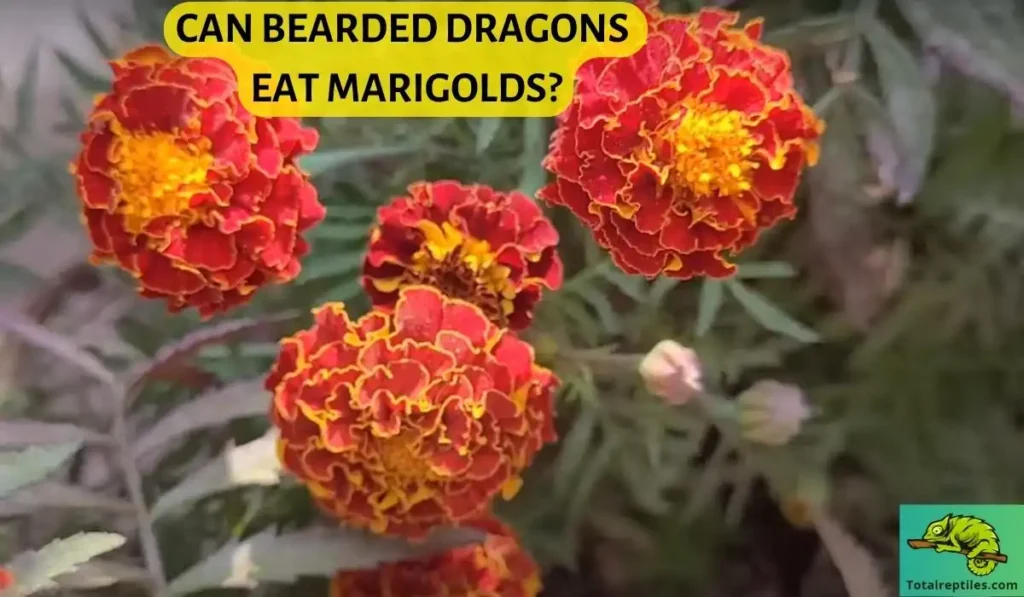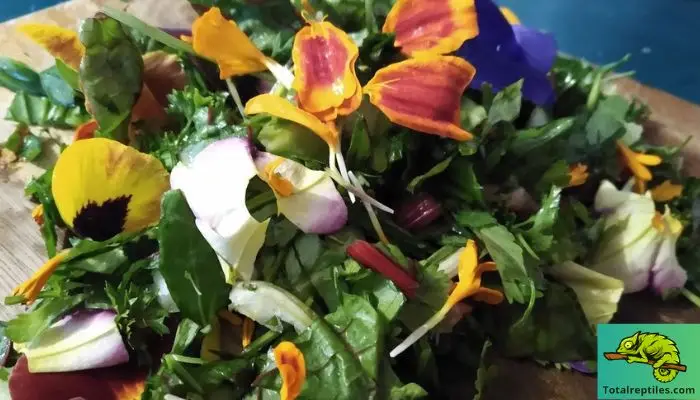When feeding our beloved bearded dragons, knowing what constitutes a safe and healthy diet is important. While these reptilian companions have quite the appetite for various insects and greens, marigolds may not be the best choice for their mealtime menu.
Despite marigolds vibrant colors and enticing appearance, bearded dragons can’t eat marigolds. But why is that? It turns out that marigolds, especially wild ones, can pose potential risks to our scaly friends.
From lurking parasites to harmful pesticides, marigolds hold hidden dangers that make them unsuitable for a bearded dragon’s diet. That’s why it’s risky to incorporate it into a bearded dragons diet.
However, you can feed organic Marigolds to your bearded dragon. Make sure it’s not from the wild. Instead, the plant is grown using organic procedures.
In this article, we’ll delve into why marigolds should be kept off the menu for these fascinating creatures, ensuring their health and well-being remain at the forefront of our care.

A little about marigolds
Marigolds are a delightful sight in gardens and floral arrangements with their radiant colors and delicate petals. The flower has a strong smell.
And it’s a member of the Tagetes and Calendula Genera. Furthermore, it falls into the Asteraceae family of plants.
READ MORE: CAN BEARDED DRAGONS EAT HIBISCUS FLOWERS?
Nutritional Composition of Marigolds
If you want to give marigolds to your bearded dragon in small amounts, the nutritional composition of Marigolds deserves your attention. Here’s a table to provide you with an accurate idea:
| Nutrient | Quantity per 100g |
| Calories | 52 |
| Carbohydrates | 11.2g |
| Protein | 3.1g |
| Fat | 0.9g |
| Fiber | 2.6g |
| Vitamin A | 6800IU |
| Vitamin C | 71mg |
| Vitamin E | 2.1mg |
| Vitamin K | 13μg |
| Calcium | 45mg |
| Iron | 0.9mg |
| Potassium | 308mg |
| Magnesium | 19mg |
| Zinc | 0.3mg |
| Phosphorus | 52mg |
| Copper | 0.1mg |
| Manganese | 0.2mg |
READ MORE: CAN BEARDED DRAGONS EAT FLOWERS?
Risks And Considerations Of Feeding Marigolds To Bearded Dragons
Before adding marigold to your Bearded Dragons diet, you better know the risks that come alongside it. Here are the considerations you should care about feeding marigolds to your Bearded Dragon:
Nutritional Imbalance
Marigolds contain certain beneficial nutrients like vitamin A and vitamin C, but they lack other essential elements such as calcium, phosphorus, and specific amino acids necessary for the overall health of these reptiles. But a Bearded Dragons diet mainly relies on protein, not plants.
Digestive Problems
Introducing marigolds into a bearded dragon’s diet can potentially result in digestive disturbances.
These flowers contain compounds that may be challenging for bearded dragons to digest, leading to gastrointestinal issues such as diarrhea, bloating, or constipation.
Their digestive systems are not naturally equipped to process the components found in marigolds.
Chemical Exposure
Marigolds grown with fertilizers, pesticides, or other chemicals pose a significant risk to the health of these reptiles. The toxic residues from such substances can accumulate in their bodies.
As a result, it leads to various health problems ranging from organ damage to neurological issues. It is crucial to source organic and chemical-free marigolds if you decide to include them in your bearded dragon’s diet.
Allergic Reactions
Just like humans, bearded dragons can also develop allergic reactions to certain substances. While uncommon, some bearded dragons may exhibit allergic symptoms when exposed to marigolds.
These reactions can manifest as skin irritations, respiratory issues, or even more severe allergic responses.
READ MORE: CAN BEARDED DRAGONS EAT ROSE PETALS?
Preparing Marigolds for Bearded Dragons – Step by Step
But after considering all risk factors, if you need to offer marigolds to your bearded dragons, you must follow these preparation steps to ensure a safe meal for your pets.

Step-1: Choose organic marigolds
When selecting marigolds for your bearded dragon, ensure that they are organic and not sourced from the wild. Organic marigolds are grown using natural procedures without the use of harmful pesticides or chemicals.
Step-2: Harvest the flowers
Look for colorful marigolds that are mature. Carefully remove the blossoms without damaging the plant. Harvesting flowers that have not been exposed to any potential contaminants is best.
Step-3: Rinse the flowers
Gently clean marigold flowers under cool running water after harvesting. Remove dust, debris, and residue from flowers with this procedure.
Step-4: Dry the flowers
After rinsing, pat the flowers dry using a clean cloth or paper towel. Avoid using any harsh drying methods or heat sources, as excessive heat can degrade the nutritional content of the flowers.
Step-5: Offer the marigolds to your bearded dragon
Place the prepared marigold flowers in your bearded dragon’s feeding dish. Ensure that the dish is clean and free from any contaminants. Bearded dragons enjoy consuming marigold flowers and benefit from their natural nutrients.
Step-6: Monitor consumption
Keep an eye on your bearded dragon while it eats the marigold flowers. Ensure that they are eating the flowers without any difficulty and show no signs of adverse reactions.
If you notice any negative changes in their behavior or health, consult a reptile veterinarian for guidance.
Conclusion
It’s best to refrain from including marigolds in a bearded dragon’s diet. This plant lacks the essential nutrients necessary for a balanced reptile diet.
The potential risks of digestive disturbances, chemical exposure, allergic reactions, and dietary monotony outweigh any potential benefits.
Opting for a diverse range of suitable staple foods ensures that our bearded dragons receive the proper nutrition they need to thrive and maintain optimal health.

